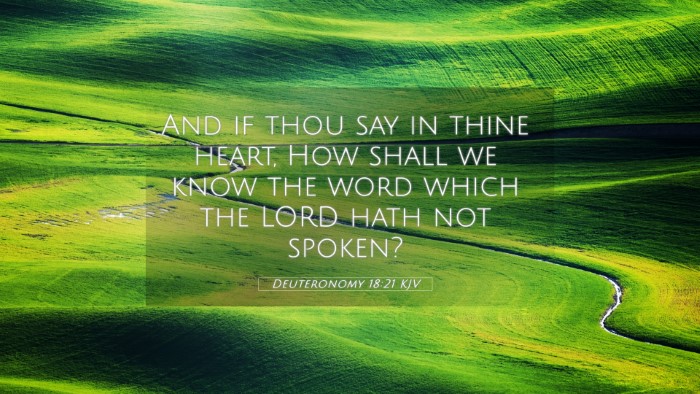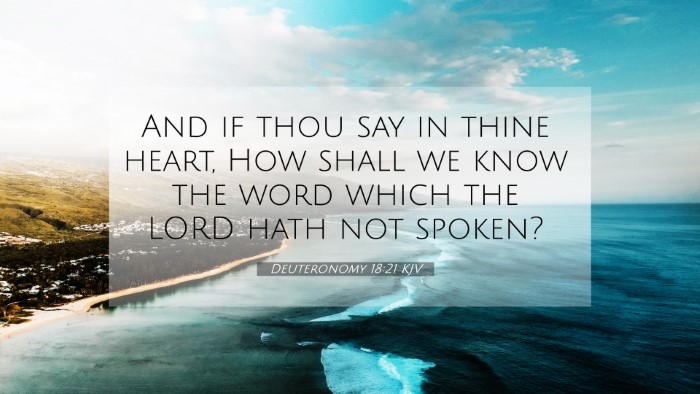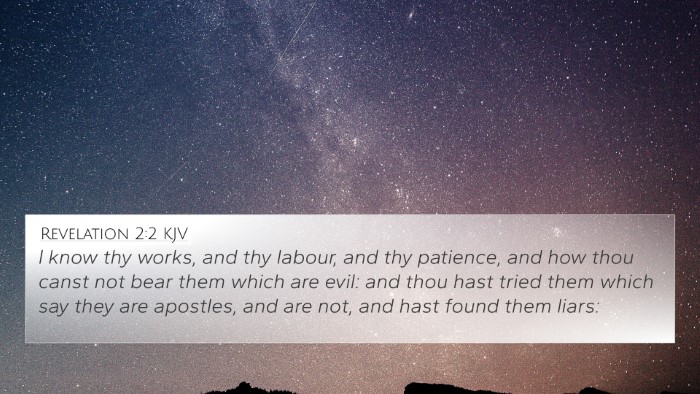Deuteronomy 18:21 - Understanding the Meaning
Deuteronomy 18:21 states: "And if you say in your heart, 'How shall we know the word which the Lord has not spoken?'" This verse addresses the concern regarding discernment in identifying true prophets and their messages.
This verse is set in the larger context of Moses' instruction to the Israelites regarding prophets. The necessity for understanding and knowing which messages come from God is pivotal, especially as the people are encouraged to seek God's will through divine revelation.
Main Insights from Public Domain Commentaries
The following insights compile interpretations from notable public domain commentaries, including those by Matthew Henry, Albert Barnes, and Adam Clarke:
Matthew Henry's Commentary
- Discernment Required: Henry emphasizes the importance of discernment among believers. He suggests that not every proclaimed word is from God and encourages believers to seek divine signs and confirmations.
- Testing Prophets: He highlights the scriptural mandate to test the spirits and discern true prophecy versus falsehood, encouraging believers to be watchful in their spiritual journey.
Albert Barnes' Notes
- Legitimate Inquiry: Barnes points out that questioning the legitimacy of prophecies is vital to understanding God’s will better, suggesting that it’s a natural aspect of faith.
- Criteria for Truth: He discusses how followers should use the scriptures as a standard to evaluate prophetic messages, underscoring the need for scriptural alignment.
Adam Clarke's Commentary
- Channel of Prophecy: Clarke explains that the verse acknowledges the human dilemma of distinguishing God's voice, affirming the importance of knowing God’s law and previous revelations.
- Responsibility of the Faithful: He stresses that the faithful are responsible for recognizing truth, criticizing the dangers of following false prophets without discernment.
Cross-References and Thematic Connections
Deuteronomy 18:21 connects with several other scripture passages that expand on the theme of prophecy and divine communication:
- 1 Thessalonians 5:20-21: "Do not despise prophecies, but test everything; hold fast what is good." This reinforces the instruction to discern true prophecies.
- Jeremiah 23:16: "Thus says the Lord of hosts: 'Do not listen to the words of the prophets who prophesy to you, filling you with vain hopes.' This warns against false prophets.
- Matthew 7:15-20: "Beware of false prophets, who come to you in sheep’s clothing but inwardly are ravenous wolves." This emphasizes the need to recognize false teachings.
- 1 John 4:1: "Beloved, do not believe every spirit, but test the spirits to see whether they are from God." This continues the call to discernment.
- Acts 17:11: "Now the Bereans were of more noble character than the Thessalonians, for they received the message with great eagerness and examined the Scriptures every day." Highlighting the importance of scripture in discerning truth.
- Revelation 22:18-19: "I warn everyone who hears the words of the prophecy of this scroll: If anyone adds anything to them, God will add to that person the plagues described in this scroll." A serious warning about tampering with God’s message.
- Deuteronomy 13:1-3: "If a prophet or a dreamer of dreams arises among you and gives you a sign or a wonder...” This passage provides additional criteria for testing prophets.
The Importance of Prophetic Discernment in Scripture
The thematic connections found in Deuteronomy 18:21 and the associated passages illustrate the importance of discernment among believers regarding prophetic messages. Amidst diverse voices and claims, the text calls for vigilance and a commitment to scriptural integrity.
Methods for Cross-Referencing Bible Verses
For a deeper understanding and study of the Bible, the following tools and methods can enhance your cross-referencing and comparative analysis:
- Bible Concordance: A valuable tool that helps locate verses based on keywords.
- Bible Cross-Reference Guide: These guides provide lists of verses that relate to specific themes or ideas.
- Bible Chain References: A method to link verses together based on themes or topics, allowing for a fluid study experience.
- Bible Study Apps: Modern resources that offer comprehensive cross-reference materials.
Conclusion
Deuteronomy 18:21 serves as a crucial reminder of the need for believers to possess the wisdom to discern divine messages amidst many voices. By engaging with scripture deeply and utilizing cross-referencing methods, individuals can enhance their understanding of God's Word and develop a more vibrant faith.





